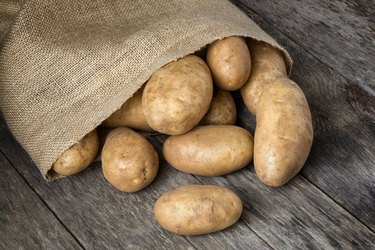
Boiling is one of many cooking methods you can use to take russet potatoes from the firm vegetables that grow in the ground to the soft, tantalizing, nutritious side dishes people love. But even though boiling whole potatoes is easy, there are other methods to consider.
Potato Health Benefits
Video of the Day
Russet potatoes are a healthy source of carbohydrates and many vitamins and minerals — but some of those nutrients are better retained in baked russet potatoes than boiled russet potatoes.
Video of the Day
According to the USDA, one medium-sized baked russet potato with its skin has about 168 calories, with no fat, about 4.5 grams of protein and 37 grams of carbohydrates, of which 4 grams are from fiber and only about 2 grams are from sugar. The potato is also a good source of iron, potassium, magnesium, zinc and vitamin C.
According to a study published in November 2018 in Nutrients, boiling will diminish the potato's water-soluble nutrients. Specifically, as noted in a study published in May 2013 in Advances in Nutrition, the potassium content will decrease from 421 milligrams per 100 grams of raw potato to 328 milligrams per 100 grams of boiled potato — that's a 22 percent reduction.
Similarly, the vitamin C content goes from 19.7 milligrams per 100 grams to 7.4 milligrams per 100 grams, a reduction of 62 percent.
Boiled Russet Potatoes for Mashing
Even if the potatoes lose some of their nutrients, boiling can be the go-to method for many people, especially if they're making mashed potatoes.
Among the many types of potatoes you could use for mashed potatoes are red potatoes and Yukon Gold potatoes, but the Idaho Potato Commission recommends russets for their better starch-to-water ratio.
Then there are several ways to prepare your boiled russet potatoes. As the commission explains, you can cut the potato into chunks, place them in cold water and bring the water to a boil. Once the potato is tender enough to be pierced by fork tines, you can remove from the heat and drain.
However, you can also leave the potatoes intact when you boil them. Other tips from the Idaho Potato Commission call for you to boil whole potatoes. You should boil potatoes with the skin because this will allow the potato to keep more of its flavor and nutrients than if you were to cut it up into pieces.
You can also boil potatoes with their skin in stock, milk or water that has been flavored with seasoning — this will enhance the taste of the boiled russet potatoes.
Read more: How to Treat Burns Caused by Boiling Water
Regardless of whether you're boiling whole potatoes or boiling potato chunks, once they are tender and drained, you should put them back in the empty pot and set them on the heat for a little while longer so that you can cook out the remaining moisture. This will ensure your mashed potatoes aren't too wet.
Putting them on the heat to remove excess moisture is important because, as the Idaho Potato Commission details, boiling whole potatoes means the starch granules absorb not only the natural moisture inside the vegetable but also the moisture from the water it is being cooked in.
These moisture-retaining starch granules can be ruptured if you spend too much time mashing and mixing the potatoes, so be careful when you get to this step in your recipe. This, too, will result in overly wet mashed potatoes.
There are many mashed potatoes recipes to choose from for using your boiled russet potatoes, and you can easily find one that fits in with your diet. For a tasty example, try our recipe for Thanksgiving Garlic Smashed Potatoes.
- Idaho Potato Commission: “The Best Way To Boil Idaho Potatoes”
- Nutrients: “Starchy Carbohydrates in a Healthy Diet: The Role of the Humble Potato”
- Advances in Nutrition: “Innovations in Food Chemistry and Processing to Enhance the Nutrient Profile of the White Potato in All Forms”
- Idaho Potato Commission: “Getting Moisture Out of Mashed Potatoes”
- USDA: “Baked Russet Potato”
- Idaho Potato Commission: "Potato Chemistry"